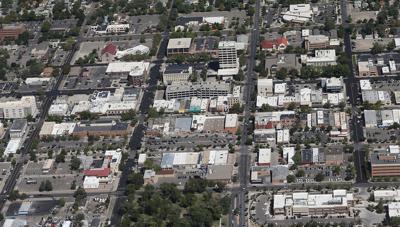City Council approves raising impact fees; here's how much it will cost developers

Staring
down a backlog of roads projects estimated at $184 million, Grand
Junction City Council members took a bit of a plunge Wednesday night and
approved big increases to the upfront fees developers pay to offset
traffic and other impacts of growth.
So-called
transportation impact fees — or Transportation Capacity Payment (TCP)
fees — will rise for residential development as a result of Wednesday's
vote, from the current $2,554 across all home types. The city will
distinguish between home sizes — the fee for residences with less than
1,250 square feet of living area will increase to $3,077.50, up to homes
with 2,300 or more square feet of living area seeing a fee increase to
$7,042. The fees associated with multifamily developments similarly will
rise in sharp fashion.
The
fees will be incrementally increased over four years, and after that
will change based on a 10-year rolling average of the Colorado
Department of Transportation's Construction Cost Index.
The new traffic impact fees were
narrowly approved 4-3 by the council, with council members Phyllis
Norris, Anna Stout and Chuck McDaniel voting against the measure.
The
motion that council approved included numbers that were 25% less than
city staff had proposed, and also changed the recommended rollout period
from three to four years.
Fee increases will begin Jan. 1, 2020.
The
TCP fees for commercial development, which also will rise, vary by
category but, for reference, the general shopping center development fee
of $4,189 per 1,000 square feet will increase to $7,227.25.
Impact fees on new residential projects haven't been raised since 2008.
To
further address the estimated $184 million gap in needed roads
projects, Grand Junction voters also are being asked this election
season to approve up to $70 million in new debt for roads projects.
OTHER FEES
Traffic impact fees were just one piece of the fee increase package approved by City Council on Wednesday.
Fees residential developers pay to
offset impacts on parks and recreation — currently at $225 per
residential unit, a fee set in 1987 — are also going to be significantly
increased. City Council members in their motion approved a jump in the
parks and rec fee for single-family homes to $1,260, and an increase for
multifamily developments to $847.50 per unit. Both will be
incrementally increased until full implementation on Jan. 1, 2023.
Brand
new fees for impacts to fire and police agencies were also approved as
part of the measure. Starting Jan. 1, 2022, new single-family residences
will be assessed a combined $1,015, and new multifamily projects will
have combined police and fire fees of $667 per dwelling attached.
Additional new fees to address impacts to municipal facilities were stripped from the proposal Wednesday.
Fees
associated with new connections to the city's water service were also
part of the increases agreed to by councilors on Wednesday.
The panel approved increases to tap and
plant investment fees that will mean new typical single-family water
connection charges will go from $1,000 to $5,180 over three years.
Only Councilor Phyllis Norris voted no on the water fee increases.
Another
change adopted by Council Wednesday will tweak policy and code to
require developers to construct safety and adjacent street improvements
related to their projects, as many other communities require.
That
change will go into effect Jan. 1, 2021. Council members Phyllis Norris
and Kraig Andrews voted no in the 5-2 approval vote.
The city engaged an ad-hoc group of
industry stakeholders during the process of raising the fees, a group
that included the Grand Junction Area Chamber of Commerce, contractors,
builders and real estate agents. While some changes were made to the
city proposal, the industry group notably ended up recommending raising
the traffic and parks fees by just 50% of what the city proposed.
The group suggested no fees be adopted for fire, police or municipal facilities.
The city's approved action Wednesday essentially split that difference.
Many
residents and representatives of industry expressed their opposition to
the steep fee increases during public participation on Wednesday.
Numerous people said they were concerned about slowing growth, and said
that consumers are likely going to be the ones picking up the tab for
the new fees.

No comments:
Post a Comment